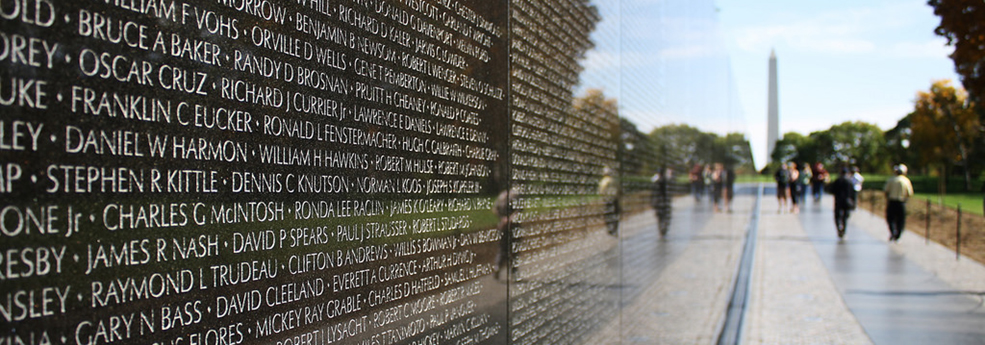
The Department of Veterans Affairs (VA) is the federal department that provides benefits for U.S. veterans, including mental health care. Until recently, the VA did not recognize or employ professional counselors to provide care to our nation’s veterans.
NBCC has advocated for increased recognition and hiring of professional counselors by the VA for years, efforts that resulted in passage of a law in 2006 adding licensed professional mental health counselors (LPMHCs) to the list of professions eligible for VA employment. NBCC continued its backing on this issue, leading to the VA’s release of qualification standards in December 2010, allowing for the hiring of LPMHCs to begin.
However, barriers remain to counselor employment in the VA, which continues to hire counselors in much lower numbers than other mental health professions. One such obstacle is the VA’s exclusion of counselors from the Health Professionals Trainee Program, the VA’s flagship recruitment program. NBCC has continued to work with the VA to further integrate the counseling profession into the VA health care system and increase hiring.
Although VA officials acknowledge the value of counselors for their mission, the pace of counselor hiring by the VA has been unacceptably slow. A 2012 hiring initiative to add 1,600 new mental health professionals to the VA workforce resulted in the employment of only a handful of counselors, despite NBCC’s work with the VA to promote the initiative.
NBCC continues to work with the VA and with Congress to determine the cause of the problem and find a solution.
NBCC is currently engaging with the VA to ensure that relevant provisions of S. 785 are enacted quickly and accurately.
S. 785 is signed into law. It directs the VA to work with the Office of Personnel Management to create an occupational series for mental health counselors working in the federal government. It also directs the VA to complete a study on how to address barriers to the hiring of counselors within the VA. Finally, it establishes the Readjustment Counseling Service Scholarship Program, which counselors are eligible for.
Sen. John Tester (D-MT) and Sen. Jerry Moran (R-KS) introduce S. 785, the Commander John Scott Hannon Veterans Mental Health Care Improvement Act of 2019. It is a sweeping VA mental health reform bill that includes many NBCC priorities.
NBCC strongly supports passage of the Commander John Scott Hannon Veterans Mental Health Improvement Act, S. 785, which would direct the VA to create an Occupational Series and a hiring plan for counselors. To learn more about this proposed federal legislation, read this summary.
Senator John McCain (R-AZ) introduced S. 992 that incudes language studying the staffing levels of mental health counselors and proposals for increasing access.
President Obama signs legislation, H.R. 6416, granting counselors with a CACREP doctoral degree the authority to become VA employees.
Senate Veterans Affairs Committee passes S. 2921, which is a repackaged version of S. 1203 that includes the counselor provisions.
Sen. James Inhofe (R-OK) and Rep. Markwayne Mullin (R-OK) introduce S. 2771 and H.R. 5161 to make graduates of CACREP doctoral programs eligible for VA employment.
Rep. Ruben Gallego (D-AZ) introduces H.R. 4011, a companion bill to S.1676.
The Senate passes S. 1203, which includes the counselor sections of S.1676.
Sen. Jon Tester (D-MT) introduces S. 1676, which mandates equal participation for counselors and MFTs in the VA trainee program, recognizes CACREP doctoral degrees, requests data on counselor/MFT participation and plans for increasing it, and urges an Occupational Series.
VA adds counselors to the trainee program and awards 18 paid internships.
President Obama signs the omnibus appropriations act, which includes language in the Military Construction, Veterans Affairs and Related Agencies Subcommittee on Appropriations report urging the VA to add counselors to the VA Health Professionals Trainee Program and requiring a report within 90 days.
NBCC includes report language in appropriations legislation directing the VA to add counselors and MFTs to the Health Professionals Trainee Program.
NBCC has continuously communicated with top VA officials, including those in the Office of Mental Health Services and the Readjustment Counseling Service, which oversees the veteran centers. In addition to letters requesting information and action to address the inadequate hiring of LPMHCs, NBCC has met with VA staff on numerous occasions, both one-on-one and with other stakeholder organizations.
While continuing to work with the VA on the issue, NBCC is seeking congressional involvement to address the low level of counselor employment. This has resulted in members of Congress voicing their dissatisfaction with the situation both in hearings and in letters, as well as bills to address the issue. At NBCC’s request, several congressional offices have submitted questions for the record to the VA seeking an update on employment numbers and steps the VA is taking to increase available positions.
The VA Office of Academic Affiliations (OAA) maintains connections with thousands of colleges and universities around the country. As part of the OAA’s associated health education program, paid trainee positions are available to mental health practitioners, including social workers and psychologists.
While professional counselors became eligible for VA hiring with the release of the 2010 handbook update, it took until 2015 for counselors to be added to the program. However, counselor participation severely lags behind the other professions, and NBCC is pursuing legislation to increase access to the profession.
The information provided by the National Board for Certified Counselors, Inc. (NBCC) on the nbcc.org website (site) is for general information purposes only. NBCC makes significant efforts to maintain current and accurate information on this site. We are not responsible for any information concerning NBCC or our programs, services, or activities that is published or displayed on any third-party website(s). These websites are maintained by third parties over which we exercise no control, and for which we have no responsibility. Individuals should verify any information obtained from third-party sources by referring to our official site or contacting our customer service team directly.
Copyright ©2025 National Board for Certified Counselors, Inc. and Affiliates | All rights reserved.